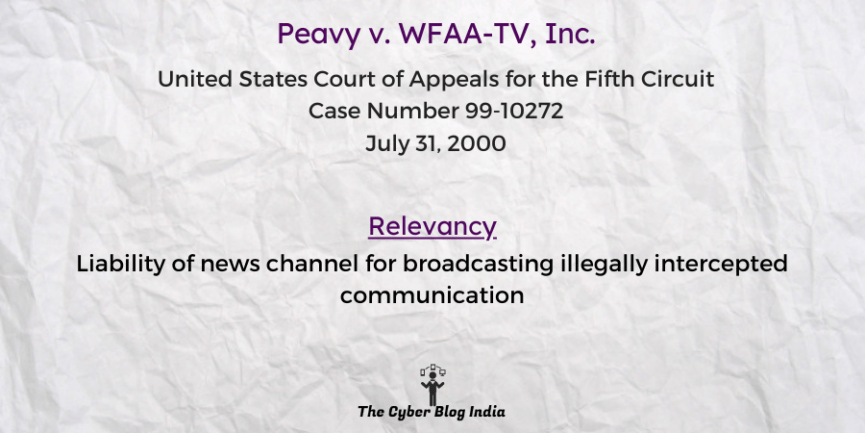Peavy v. WFAA-TV, Inc.

Peavy v. WFAA-TV, Inc.
221 F.3d 158
In the United States Court of Appeals for the Fifth Circuit
Case Number 99-10272
Before Circuit Judge Politz, Circuit Judge Jolly, and Circuit Judge Barksdale
Decided on July 31, 2000
Relevancy of the Case: Liability of news channel for broadcasting illegally intercepted communication
Statutes and Provisions Involved
- The Omnibus Crime Control and Safe Streets Act, 18 U.S.C. §§ 2510-2520
Relevant Facts of the Case
- Peavy was a trustee for the Dallas Independent School District (DISD) and controlled insurance purchases of DISD employees. In the past, they had various disputes with their neighbours, the Harmans.
- Harman got a police scanner to monitor police activity in the area. He overheard a telephone conversation where Peavy discussed filing a class action against the Harman with another neighbour.
- Harman locked the scanner’s frequency for Peavy’s cordless telephone. He kept on listening to their conversations and recording them.
- He claimed to have consulted various law enforcement officials regarding the legality of intercepting. All of them told him it was legal.
- Harman, after that, contacted WFAA and spoke to a producer, who tipped Riggs. He played some recordings for Riggs. Riggs knew that the parties to the conversations were unaware of and did not consent to the interception of the recordings.
- However, Riggs took the tape of the conversations to WFAA, and the News Director and the producer agreed to investigate Peavy’s activities. WFAA’s legal counsel told Riggs that it was legal to intercept and record cordless telephone conversations. However, a month later, the legal counsel informed WFAA that it was illegal to intercept calls and advised them not to accept or use the tapes anymore.
- WFAA returned the tapes to Harman and advised him not to intercept calls anymore. However, he continued to do so. Meanwhile, WFAA continued to investigate Peavy through other means. Later, a court indicted Peavy for bribery and other offences related to DISD insurance. However, he was later acquitted.
- After Riggs learned about the illegality of interception, he disclosed the tapes to law enforcement agencies.
- Peavy filed an action against WFAA and Riggs. The Magistrate Judge concluded that WFAA and Riggs violated the federal and Texas state wiretapping laws and awarded a summary judgment.
Prominent Arguments by the Counsels
- The plaintiff’s counsel argued that ignorance or mistake of law is not a defence to civil conspiracy. It is irrelevant whether defendants knew their actions violated the state wiretapping laws. “Obtain” does not require active participation. Further, wiretapping laws are not subject to extensive First Amendment scrutiny. Wiretapping laws are content-neutral and do not single out the media for special burdens.
- The defendants’ counsel contested that the wiretapping statutes are unconstitutional for vagueness and overbreadth. Their association with the Harmans and the receipt of tapes did not constitute obtaining Hermans to make the interceptions. They did not aid and abet the interceptions. Their broadcast was independent of the contents of the tape. Moreover, disclosures to their employees and attorneys are not actionable. The First Amendment prohibits punishing the media for using and disclosing lawfully received truthful information about matters of public significance.
Opinion of the Bench
- Riggs later obtained the same information from independent sources. This fact is irrelevant because the exclusionary rule does not excuse a substantive violation of the law.
- Harmans intercepted the plaintiff’s conversations illegally. However, the defendants lawfully obtained them because they neither participated nor procured the Harmans to do so.
Final Decision
- The court affirmed the summary judgment, dismissing the plaintiff’s claim for damages against the defendants for procuring the Hermans to make the interceptions. The defendants have used and disclosed the contents of the intercepted communications for purposes other than television broadcasting.
- The court reversed the summary judgment, holding the defendants civilly liable for use and disclosure. Further, the court vacated the summary judgment, dismissing the plaintiff’s claims for obtaining the Hermans for interception and civil conspiracy under state laws.
- The court remanded the case for further proceedings consistent with this opinion.
Anjali Agrawal, an undergraduate student at the NALSAR University of Law, prepared this case summary during her internship with The Cyber Blog India in May/June 2022.
